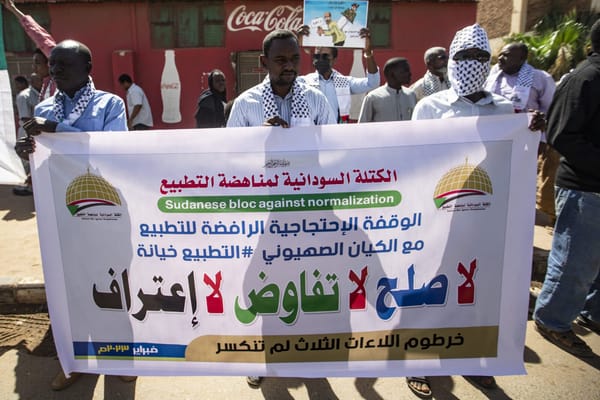Mere months ago, devotees of President George W. Bush's Iraq adventure were positively giddy. Not only were they convinced that Iraq was on the fast track to peace, prosperity and perpetual friendliness with Washington, they believed that countries across the Greater Middle East were following close behind. Neo-conservative pundits openly awarded Bush credit for the "Arab spring" that bloomed in Lebanon and Egypt shortly after thousands of Iraqi voters and scores of Congressional Republicans waved purple fingers at the cameras. "Three cheers for the Bush doctrine," Charles Krauthammer titled his column in Time on March 14. He continued: "It was not people power that set this in motion. It was American power. People power followed."
Secretary of State Condoleezza Rice experienced an "emotional high" of her own while speaking at the American University in Cairo on June 20. Invoking the abolitionist and civil rights struggles in the US, she declared that, in Egypt and across the Middle East, "the fear of free choices can no longer justify the denial of liberty." "It was important for an American official to give that speech in the heart of the Arab world," Rice beamed at interviewers later. Autocratic leaders and long-suffering peoples alike needed to know that henceforth the US would stand with the latter against the former, Saddam Hussein being the case in point.
So disciples of the Bush doctrine must have found it jarring to open the August 14, 2005 Washington Post and read a "senior official involved in policy since the 2003 invasion" quoted as saying: "What we expected to achieve was never realistic given the timetable or what unfolded on the ground. We are in a process of absorbing the factors of the situation we�re in and shedding the unreality that dominated at the beginning."
Thus did the official explain to the Post why, in the oft-quoted words of the headline writers, the United States has "lowered [its] sights on what can be achieved in Iraq." Historians may date the retreat of the formerly ebullient Bush administration into what one of its spokesmen once disparaged as "the reality-based community" to the publication of this article. Therein unnamed officials acknowledge, among other things long understood by the reality-based among us, that no constitution written by the US-backed transitional government will resemble the document of the neo-conservatives' dreams and that no milestone for the US-sponsored political transition will mark the end of the Iraqi insurgency. Surely the administration will not want to tout such an Iraq as a model for the region.
What gives with all this absorbing of factors and shedding of unreality? How did the soaring cadences of June lapse into the plodding bureaucratese of August? In some right-wing circles, there is grumbling about a slide from unadulterated neo-conservatism into the "practical idealism" attributed to Rice. Did the true believers vote for Bush and get John Kerry's foreign policy?
A simpler explanation would be that the conflagration in Iraq, its cost in lives and currency ever greater and ever harder to justify to a querulous public, has dictated the seeming ideological shift. As the war drags on, rather than pointing Arab nations to the beacon of Iraq, the US is likely to treat Iraq as it has traditionally treated its other Arab allies. To wit, the trappings of democracy are more important than the content, responsibility for "reform" is entrusted to those in power and support for democracy is subordinate to US strategic goals.
If that is "practical idealism," then Rice's speech at AUC was a prime example. She began by insisting that, contrary to popular belief in the region, the US does not want to "impose" a particular form of government when it speaks of spreading democracy. Each country will choose its own form of democracy, she said, but at a minimum democracy means the rights to speak and associate freely and "freedom from the midnight knock of the secret police." The Egyptian regime did not escape criticism. "We are all concerned," she said, "when peaceful supporters of democracy face violence" -- a reference to the beatings visited upon protesters outside polling stations on the day of the referendum on President Husni Mubarak's amendment to the constitution allowing for a multi-party presidential election.
Two months later, a pall of disappointment hangs over Egypt, not because the regime has ignored Rice's words, but rather because it has heeded them well enough to satisfy Washington. Opposition forces can speak, write and associate with relative freedom -- except the outlawed Muslim Brothers, about whom Rice said nothing. Mubarak took the rap on the knuckles for the referendum-day thuggery, but surely smiled when Rice said nothing about why the "supporters of democracy" were protesting. The constitutional amendment placed enough restrictions on who can run that the ruling party's man is assured of victory, even if, as the secretary of state stipulated, voting occurs "without violence or intimidation." Though the protesters do not accept the rules of the contest that the regime has devised, Rice admonished them that they "must peacefully accept the results." Little wonder, then, that Mubarak feels entirely safe running for a fifth term as president.
With the connivance of Egyptian intelligence, a similar scenario unfolded in Palestine, another Arab country hailed in Bush administration orations for its electoral exercise. In late May, Bush introduced President Mahmoud Abbas to the White House press corps as a man whose campaign slogan could have been: "Vote for me -- I'm for peace, and I believe in democracy." But there were no remonstrations from Washington when the Palestinian Authority postponed legislative elections planned for July for fear that Hamas might perform too well. Nor did the State Department object when Abbas put off the general congress of his Fatah party until after the parliamentary polls now rescheduled for January 2006. Fatah reformers might have overthrown the "old guard" in party councils, imperiling the PA's decision to cooperate with Israeli Prime Minister Ariel Sharon's ongoing "disengagement" from the Gaza Strip, despite the comment of a Sharon adviser that this unilateral maneuver is intended to apply the "formaldehyde that is necessary so there will not be a political process with the Palestinians." The Bush administration, having nodded vigorously for three years whenever Sharon placed the onus for peace on Palestinian "reform," has never been interested in how Palestinians define the concept.
It was a State Department official, Paula Dobriansky, who coined the term "Cedar Revolution" for the Arab spring's most dramatic and consequential events. But the US had little to do with what the Lebanese called the Independence Intifada -- the campaign of popular pressure that brought down a government and compelled the hasty departure of an occupying army. The protesters who camped out for weeks in downtown Beirut's Martyrs' Square harbored fervent hopes of extracting "the truth" about who killed ex-Prime Minister Rafiq al-Hariri -- hinting at grander aspirations for a new politics of transparency and accountability. Both the anti-Syrian demonstrations and the Hizballah counter-demonstrations espoused a symbolism of national unity. But here, as well, the hopes of the spring wilted in the summer doldrums.
By the time of Lebanon's May-June parliamentary elections, an old type of politics was back. The campaign was driven by horse trading among the self-appointed representatives of the country's 18 confessional communities, not by the comprehensive visions for Lebanon�s future for which demonstrators and counter-demonstrators alike were searching. The anti-Syrian opposition fractured, allowing an unpopular electoral law drafted under Syrian tutelage to stand and eventually allowing Emile Lahoud to remain in the presidential office where Syrian intervention had installed him. One of the first acts of the new government was to pardon former Phalangist warlord Samir Geagea, a reminder of how much of "the truth" about the 1975-1990 civil war remains buried under willful forgetfulness. With the June assassinations of journalist Samir Kassir and former Communist Party head Georges Hawi also still unsolved, Lebanon is not free from fear. Not that anyone consuming American news would know, since Lebanon has lost its media-ready narrative of good guys and bad guys, and, at least for the time being, the US cannot use events there as a club to beat Syria.
The Baathist clique in Damascus, which had more to fear from the Bush doctrine than any other regime, cannot be distressed to watch Iraq revert to being a place where opponents of the government sometimes hear the midnight knock of the secret police. Elections in Iraq have not ushered in a representative democracy, but rather have emboldened the victors to press maximalist demands in the constitution drafting process. The Kurds have extended the borders of their desired mega-province southward, and the Shi'i religious parties insist that Islam should be the basis of Iraqi law. The coercion, US and Iraqi, that has so far been required to contain the country's centrifugal forces is hardly nurturing a state culture of respect for rule of law and civil rights. Rather than trumpeting its envisioned model democracy, the Bush administration could soon be cultivating ties with an Iraqi quasi-autocracy willing to host a US base or two.
"For 60 years," Rice intoned in the AUC auditorium, "my country, the United States, pursued stability at the expense of democracy in this region here in the Middle East -- and we achieved neither." This sentence, since repeated like a mantra by more junior officials, implies that the Bush administration believes democracy is worth a little instability. In the real world, the administration's policies promote neither democracy nor stability -- and achieve neither as well.
Written by
This article was published in Issue 236.









